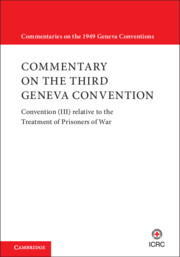 Commentary on the Third Geneva Convention
Commentary on the Third Geneva Convention Book contents
- Commentary on the Third Geneva Convention
- International Committee of the Red Cross
- Copyright page
- Contents
- Foreword by Peter Maurer
- Acknowledgements
- Abbreviations
- Introduction
- Preamble
- Part I General Provisions
- Part II General Protection of Prisoners of War
- Part III Captivity
- Part IV Termination of Captivity
- Part V Information Bureaux and Relief Societies for Prisoners of War
- Article 122 National Information Bureaux
- Article 123 Central Tracing Agency
- Article 124 Exemption from Charges of National Information Bureaux and the Central Tracing Agency
- Article 125 Facilities for Relief Societies and Other Organizations Assisting Prisoners of War
- Part VI Execution of the Convention
- Book part
- Sources
- Index
- References
Article 123 - Central Tracing Agency
from Part V - Information Bureaux and Relief Societies for Prisoners of War
Published online by Cambridge University Press: 21 August 2021
- Commentary on the Third Geneva Convention
- International Committee of the Red Cross
- Copyright page
- Contents
- Foreword by Peter Maurer
- Acknowledgements
- Abbreviations
- Introduction
- Preamble
- Part I General Provisions
- Part II General Protection of Prisoners of War
- Part III Captivity
- Part IV Termination of Captivity
- Part V Information Bureaux and Relief Societies for Prisoners of War
- Article 122 National Information Bureaux
- Article 123 Central Tracing Agency
- Article 124 Exemption from Charges of National Information Bureaux and the Central Tracing Agency
- Article 125 Facilities for Relief Societies and Other Organizations Assisting Prisoners of War
- Part VI Execution of the Convention
- Book part
- Sources
- Index
- References
Summary
The ICRC’s original remit was to alleviate the suffering of members of thearmed forces during armed conflict. It soon became clear, however, that therewas also a need to respond to the distress of families caused by not knowingwhat had happened to their relatives. Recognition of this need prompted theICRC, as early as 1870, to establish an agency for this purpose, initially on anad hoc basis. The structure took on greater permanence during and after theFirst World War, a fact acknowledged in the 1929 Geneva Convention on Prisonersof War. In 1949, the Diplomatic Conference reaffirmed the importance of theAgency’s work, incorporating in the present provision of the Third Convention anobligation for High Contracting Parties to establish such a body for prisonersof war. The same obligation with respect to civilian internees and otherprotected civilians was included in the Fourth Convention.
- Type
- Chapter
- Information
- Commentary on the Third Geneva ConventionConvention (III) relative to the Treatment of Prisoners of War, pp. 1744 - 1765Publisher: Cambridge University PressPrint publication year: 2021
